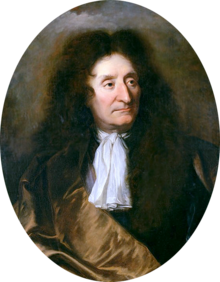Jean de La Fontaine
| Jean de La Fontaine | |
|---|---|

Portrait by Hyacinthe Rigaud (private collection)
|
|
| Born |
8 July 1621 Château-Thierry, Champagne, France |
| Died | 13 April 1695 (aged 73) Neuilly-sur-Seine, Île-de-France, France |
| Occupation | Fabulist, poet |
Jean de La Fontaine (IPA: [ʒɑ̃ də la fɔ̃tɛn]; 8 July 1621 – 13 April 1695) was a famous French fabulist and one of the most widely read French poets of the 17th century. He is known above all for his Fables, which provided a model for subsequent fabulists across Europe and numerous alternative versions in France, and in French regional languages.
After a long period of royal suspicion, he was at last admitted to the French Academy and his reputation in France has never faded since. Evidence of this is found in the many pictures and statues of the writer, as well as later depictions on medals, coins and postage stamps.
La Fontaine was born at Château-Thierry in France. His father was Charles de La Fontaine, — a kind of deputy-ranger — of the Duchy of Château-Thierry; his mother was Françoise Pidoux. Both sides of his family were of the highest provincial middle class; though they were not noble, his father was fairly wealthy.
Jean, the eldest child, was educated at the collège (grammar school) of Château-Thierry, and at the end of his school days he entered the Oratory in May 1641, and the seminary of Saint-Magloire in October of the same year; but a very short sojourn proved to him that he had mistaken his vocation. He then apparently studied law, and is said to have been admitted as avocat/lawyer.
He was, however, settled in life, or at least might have been so, somewhat early. In 1647 his father resigned his rangership in his favor, and arranged a marriage for him with Marie Héricart, a girl of fourteen, who brought him 20,000 livres, and expectations. She seems to have been both beautiful and intelligent, but the two did not get along well together. There appears to be absolutely no ground for the vague scandal as to her conduct, which was, for the most part, raised long afterwards by gossip or personal enemies of La Fontaine. All that can be positively said against her is that she was a negligent housewife and an inveterate novel reader; La Fontaine himself was constantly away from home, was certainly not strict in point of conjugal fidelity, and was so bad a man of business that his affairs became involved in hopeless difficulty, and a financial separation of property (separation de biens) had to take place in 1658. This was a perfectly amicable transaction for the benefit of the family; by degrees, however, the pair, still without any actual quarrel, ceased to live together, and for the greater part of the last forty years of La Fontaine's life he lived in Paris while his wife remained in Chateau Thierry which, however, he frequently visited. One son was born to them in 1653, and was educated and taken care of wholly by his mother.
...
Wikipedia
